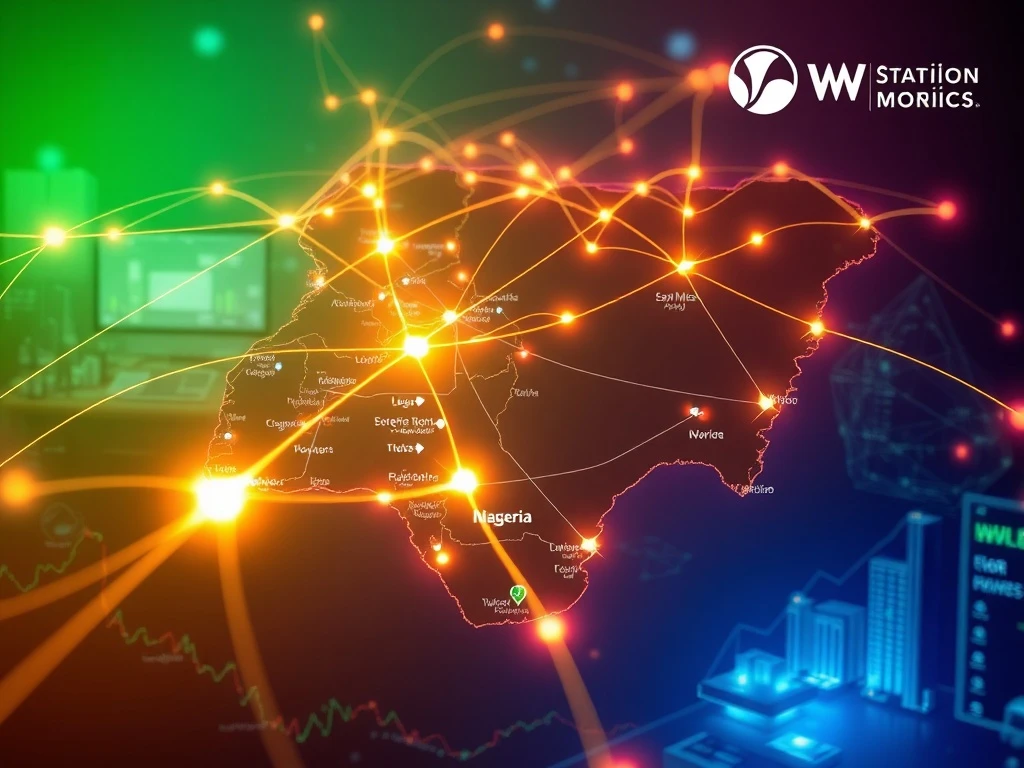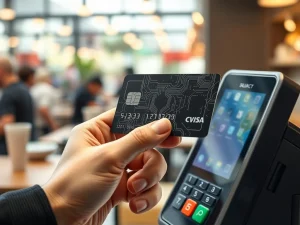Nigeria’s Transformative 90,000km Fiber Optic Network: A Catalyst for Unprecedented GDP Growth

In an increasingly interconnected world, digital infrastructure is no longer a luxury but a fundamental necessity for economic prosperity and social inclusion. For a nation like Nigeria, with its vast population and immense potential, bridging the digital divide is paramount. This ambition has just received a monumental boost: formal backing from the World Bank for an ambitious 90,000km Nigeria fiber optic network expansion. This project is set to revolutionize the country’s digital landscape, promising significant strides in economic development and an unprecedented boost to its Gross Domestic Product (GDP).
Unveiling Nigeria’s Ambitious Digital Infrastructure Leap
Nigeria is embarking on a strategic mission to overhaul its digital backbone. The existing 35,000km fiber network is set to expand dramatically, adding another 90,000km to reach a staggering 125,000km. This isn’t just about laying cables; it’s about laying the groundwork for a future where every Nigerian has access to high-speed, reliable internet.
The project is structured as a self-financing Special Purpose Vehicle (SPV), designed for long-term sustainability without burdening public finances. Key aspects of this innovative model include:
- Private Sector Leadership: Private investors will hold a commanding 51% stake, ensuring market-driven efficiency and innovation.
- World Bank’s Anchor Investment: The World Bank, alongside other development partners, is poised to contribute at least $500 million, providing a critical financial anchor.
- Government’s Strategic Minority: The Federal Government will maintain a minority ownership, underscoring a robust public-private partnership.
Communications Minister Bosun Tijani aptly characterized this effort as a “once-and-for-all” infrastructure upgrade, signaling a definitive commitment to resolving long-standing connectivity issues that have hampered service quality from mobile operators.
Why is the World Bank Backing Nigeria’s Broadband Expansion?
The World Bank’s endorsement of this colossal project is a testament to its potential impact. World Bank Managing Director Anshula Kant emphasized the initiative’s direct alignment with the institution’s core mission: eradicating poverty and promoting inclusive growth. But what exactly makes this broadband expansion so compelling for an international financial institution?
The answer lies in the profound economic multiplier effect of improved digital access. According to the World Bank, a mere 10% improvement in broadband quality could enhance Nigeria’s Nigeria GDP growth by an impressive 1.35 percentage points. This isn’t just theoretical; it’s a proven correlation observed in economies worldwide.
Beyond the direct economic uplift, the project promises transformative benefits across critical sectors:
- Agriculture: Enhanced connectivity can empower farmers with real-time market data, weather forecasts, and access to modern farming techniques.
- Education: Remote learning opportunities, digital libraries, and online educational resources become accessible, bridging educational gaps.
- Healthcare: Telemedicine, remote diagnostics, and efficient health information systems can significantly improve healthcare delivery, especially in underserved areas.
The World Bank’s engagement extends beyond this project, reflecting its ongoing $9 billion commitment to Nigeria across vital sectors like power, education, and rural infrastructure. Future collaborations are set to focus on agribusiness value chains, renewable energy, and SME finance, all complementing the fiber network’s role in advancing the digital economy.
Boosting Nigeria’s GDP: The Economic Ripple Effect of Enhanced Connectivity
The promise of a 1.35% GDP boost for every 10% improvement in broadband quality is a powerful motivator. But how exactly does robust digital infrastructure translate into tangible economic benefits for everyday Nigerians and the national economy?
The expanded network will serve as the bedrock for a burgeoning digital economy, fostering innovations in various fields:
- E-governance: Streamlining public services, improving transparency, and enhancing citizen engagement.
- Fintech: Accelerating financial inclusion, enabling seamless digital payments, and fostering a vibrant startup ecosystem.
- Health Tech: Revolutionizing healthcare delivery through remote consultations, digital health records, and data-driven public health initiatives.
- Job Creation: The construction phase itself will create numerous jobs, followed by a surge in employment opportunities in the tech sector, digital services, and related industries.
- Attracting Investment: A strong digital backbone makes Nigeria a more attractive destination for foreign direct investment, particularly in technology and knowledge-based industries.
Finance Minister Wale Edun highlighted the SPV’s user-funded model, where households and businesses will pay for services directly. This approach not only eliminates public debt risks but also aligns with President Bola Tinubu’s broader economic agenda, which includes naira stabilization and attracting sustainable investment.
Navigating the Path Forward: Challenges and Opportunities for Nigeria’s Fiber Optic Network
While the World Bank’s backing provides a strong foundation, the success of this ambitious project hinges on effective execution and strategic planning. Several key considerations will determine its long-term impact:
- Securing Private Capital: The $500 million from the World Bank is crucial, but securing the remaining private-sector funding will be vital for full implementation. This requires a conducive investment climate and clear regulatory frameworks.
- Affordability for All: The user-funded model, while financially sound, raises questions about affordability for low-income populations. Ensuring equitable access will require careful consideration of pricing structures and potential subsidy models to prevent a new form of digital exclusion.
- Execution Timelines: The design phase is finalized, with route maps expected within two months and construction slated to begin before year-end 2025. Adhering to these timelines will be critical for maintaining momentum and delivering promised benefits.
- Infrastructure Protection: Protecting the vast network from vandalism and ensuring its long-term maintenance will be ongoing challenges requiring robust security measures and community engagement.
Minister Tijani’s vision of a “nationwide digital ring” designed to reach underserved communities is inspiring. This network promises to foster innovations that transcend traditional economic boundaries, pushing Nigeria further into the global digital arena.
The Future of Connectivity: A New Dawn for Nigeria
The World Bank’s endorsement of Nigeria’s 90,000km Nigeria fiber optic network expansion marks a pivotal moment in the nation’s development journey. This project is more than just an infrastructure upgrade; it’s a strategic investment in human potential, economic diversification, and a more inclusive future.
By connecting homes, schools, hospitals, and businesses across all geopolitical zones, Nigeria is not just closing a connectivity gap; it’s opening up a world of opportunities. The success of this initiative will serve as a powerful blueprint for other developing nations, demonstrating how strategic partnerships and innovative financing models can unlock immense digital dividends. As construction gears up, the eyes of the world will be on Nigeria, watching this transformative digital leap unfold.
Frequently Asked Questions (FAQs)
Q1: What is the scope of Nigeria’s fiber-optic network expansion project?
A1: The project aims to expand Nigeria’s existing 35,000km fiber network by an additional 90,000km, bringing the total length to 125,000km. This expansion is designed to connect homes, schools, hospitals, and businesses across all geopolitical zones of the country.
Q2: How is the project being financed, and what is the World Bank’s role?
A2: The project is structured as a self-financing Special Purpose Vehicle (SPV). Private investors will hold a 51% stake, ensuring a public-private partnership model. The World Bank, along with other development partners, is expected to contribute at least $500 million, acting as a crucial anchor investor. The Federal Government will maintain a minority ownership.
Q3: How will this broadband expansion impact Nigeria’s GDP?
A3: According to the World Bank, a 10% improvement in broadband quality could enhance Nigeria’s GDP by 1.35 percentage points. This boost is expected to come from increased productivity in sectors like agriculture, education, and healthcare, as well as fostering innovations in e-governance, fintech, and health tech.
Q4: What are the key benefits of improved digital access for Nigerians?
A4: Improved digital access will lead to better quality services from mobile operators, enhanced educational opportunities through online learning, improved healthcare delivery via telemedicine, increased financial inclusion through digital payment systems, and greater opportunities for small and medium-sized enterprises (SMEs) to access markets and information.
Q5: What are the main challenges for the project’s success?
A5: Key challenges include securing the remaining private-sector funding beyond the initial World Bank contribution, ensuring the affordability of services for low-income populations under the user-funded model, adhering to ambitious execution timelines, and protecting the extensive network infrastructure from damage or vandalism.
Q6: When is construction expected to begin for the new fiber-optic network?
A6: The design phase of the project has been finalized, and route maps are set to be published publicly within two months. Construction is slated to begin before the end of 2025.









